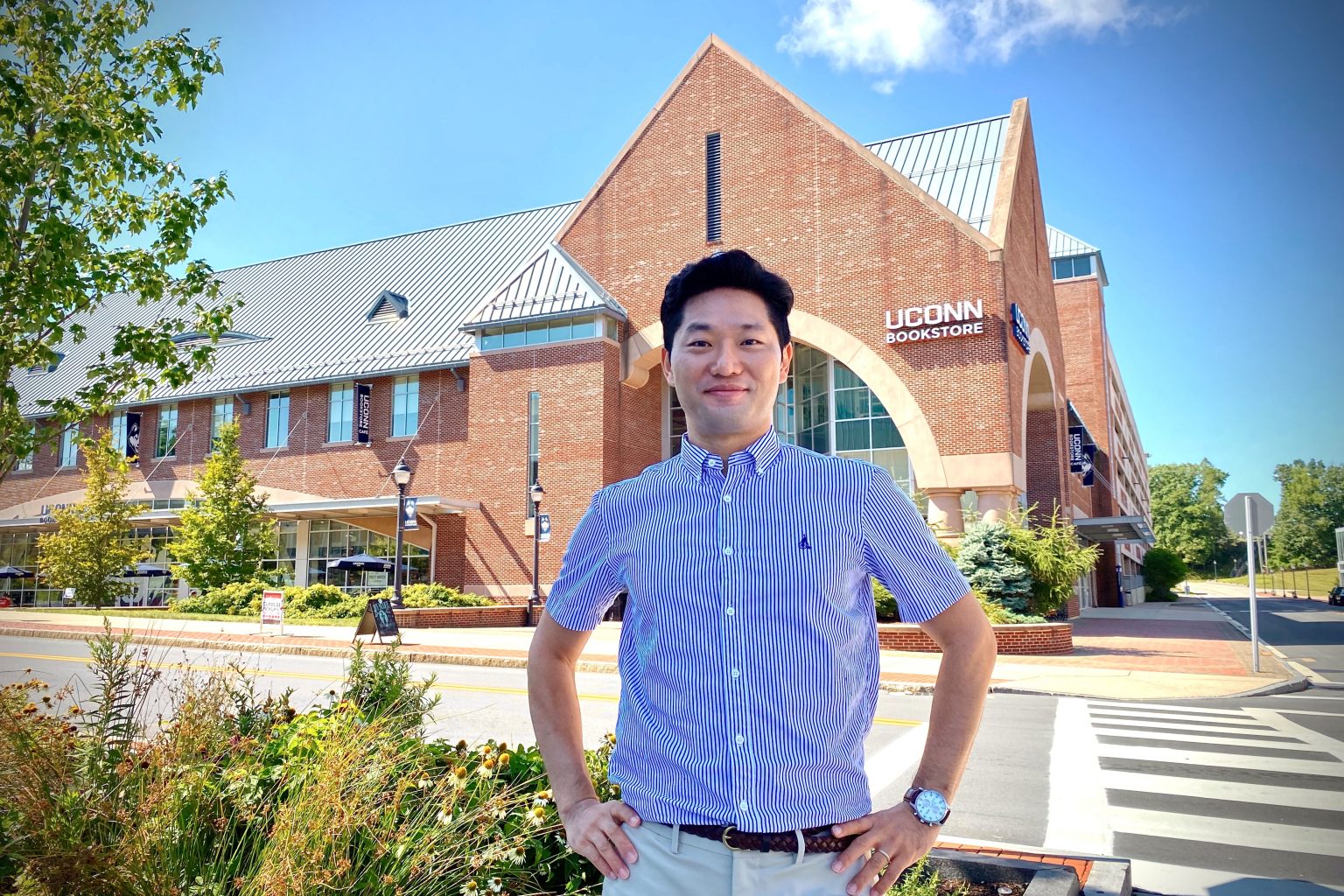Sangyong Choi has joined the Department of Nutritional Sciences in the College of Agriculture, Health and Natural Resources as an assistant professor. He became familiar with the UConn program while attending nutrition conferences and was excited to become a member of the department in what he considers his dream job. Choi relocated to Connecticut with his wife, who is completing her Ph.D. in English education remotely at Ohio State University. They are expecting their first child in October. He likens the wooded Storrs area to living at a resort while still having access to the city. Here’s what he had to say in an interview.
Where did you get your degrees?
I received my bachelor of science at Yonsei University in Korea, double majoring in biology and food and nutrition, as well as my master of science in food and nutrition at the same institution. For my doctoral studies, I went to Ohio State University (OSU) and earned my degree in nutrition sciences.
What did you do before coming to UConn?
Upon earning my doctoral degree in nutrition, to extend my training, I sought research opportunities more focused on human health and diseases and started my professional career as a postdoctoral researcher at OSU Wexner Medical Center, a national comprehensive cancer center. In the following year, along with my postdoc advisor, Dr. Zui Pan, I moved to the University of Texas at Arlington (UTA), where I not only continued my research in esophageal cancer and cardiac diseases but also obtained experience as a researcher and campus community member. As a postdoc, I helped set up Dr. Pan’s new lab, organizing lab space, ordering new equipment and completing training with lab members.
In an effort to build a safe and productive research environment, I served as a mentor at UTA’s animal care facility and interacted with students and researchers from various departments on campus, such as bioengineering and bioinformatics, and other institutions, which led to fruitful discussions and collaborative projects. Amid tight experiment schedules, I was able to attend seminars and sessions on campus in various areas including data analysis, data visualization, grant writing and teaching. I also participated in campus-wide and college events, such as homecoming marathons and parades, galas in appreciation of donors for the college, and Thanksgiving dinners. These refreshing events helped me not only appreciate such resources and build a stronger sense of inclusiveness, but also to encourage students and colleagues to take part in them as well. As a new faculty at UConn, despite the changes and challenges in the COVID-19 era, I look forward to both attending as well as sharing and supporting such events and resources on campus and in the community.
What will your work here at UConn focus on?
My research at UConn will focus on the interaction of genes and nutrients, investigating bidirectional effects of these two substances—substance of heredity information in our bodies and substance in the food we eat. To understand nutrient metabolisms that regulate human health and diseases, my lab will study how genes control nutrient status at levels of the cell, organ and body. We will also examine the underlying mechanisms by which abnormal nutrient status contributes to pathophysiological conditions in the body. A specific nutrient of interest in my research is zinc, and the metabolism of this micronutrient has been found to be disrupted in a variety of disorders including diabetes, cardiovascular and neurological diseases and cancer. My lab will expand our knowledge about this and other micronutrients’ mechanisms and their impact on health using molecular biology, biochemistry and genetics techniques.
Name one aspect of your work that you really like.
I really like how my work relates to daily choices that people make regarding foods and their effect on our bodies. A lot of us have probably heard of the old saying “you are what you eat,” which stresses the importance of eating the right foods to be healthy. I have been amazed by this idea that the foods we eat everyday have a lasting impact on our bodies, and it is this interest that has led me to scientifically study the impact of foods on our bodies as well as how the body responds to such foods and nutrients, and furthermore, how the responses or mechanisms differ among people, i.e., personalized nutrition. Also exciting is that the growing body of knowledge obtained from such scientific endeavors affects people’s conversations and practices related to eating via political policies and education programs.
Is there anything else you would like us to know about you?
I’d like students, staff, faculty and other UConn communities to know that I am open and available to talk about research possibilities and daily life practices regarding nutritional sciences. Before my first and continued visits to a food and nutrition professor’s office in Korea, I did not know much about the food and nutrition department and its multidisciplinary nature—the various interrelated fields, the range of questions studied and techniques used and the wide applications in society. I still remember the energy and excitement I felt after my first visit to the office of my MS mentor, Dr. Kim, and I am grateful to have had invigorating experiences with my Ph.D. and postdoc mentors, Dr. Bird and Dr. Pan, as well as colleagues, mentees and collaborators. To students and trainees at UConn, I hope to be “the professor” and mentor in the course of seeking and fulfilling their interest, education or academic career; to others in the community, I will strive to be a collaborator and supporter. As a faculty member of NUSC, I strongly believe in the phrase “we do science to improve nutritional well-being,” which is not only posted on the department’s office walls and webpages but also practiced by its members.



